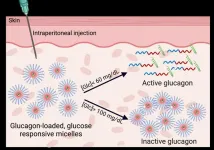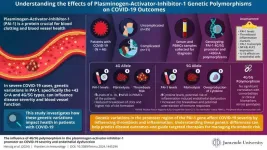(Press-News.org) October 2, 2024, TORONTO – The Ontario Institute for Cancer Research (OICR) continues to support Ontario drug discovery research by funding high-quality investigations of new therapies for some of the most prevalent pediatric and adult cancers. These projects are tackling substantial challenges in cancer by increasing the effectiveness and availability of immunotherapies, making cancer more vulnerable to chemotherapy and developing a new drug for one of the deadliest forms of childhood brain cancer.
OICR’s Cancer Therapeutics Innovation Pipeline (CTIP) initiative is supporting three research teams with up to $300,000 each to conduct Early Validation projects and another with $300,000 for a Late Accelerator project. Early Validation projects aim to lay the groundwork for future therapies by accumulating evidence that ‘targeting’ specific molecules in cancer cells have the potential to become a therapy for cancer patients in the future. Late Accelerator projects aim to speed the creation of new drugs that act on relevant, validated cancer targets.
CTIP’s committee of experts from academia and industry reviews initial applications for funding and provides scientific and strategic advice to the funded research teams to help them advance their discoveries and offer guidance on attracting the partnerships and investments needed to bring new drugs to the clinic.
“Ontario is home to some of the world’s best drug discovery researchers and we are proud to provide them with this support to see that the newest precision cancer treatments reach patients as soon as possible,” said Dr. Laszlo Radvanyi, OICR’s President and Scientific Director. “This funding will also help further strengthen drug discovery research in the province and boost collaboration in our cancer research community.”
“Ontario is proud to support the work of OICR and programs like the Cancer Therapeutics Innovation Pipeline that lead to new discoveries and innovations in cancer research,” said Nolan Quinn, Minister of Colleges and Universities. “It is very encouraging to see promising new therapies like these that have the potential to help patients beat some of the most common types of cancer and lead longer and healthier lives.”
Funded projects
Early Validation
Generating an anti-BCMA trispecific natural killer engager for use in multiple myeloma
Principal investigators: Dr. Alissa Visram, The Ottawa Hospital and Dr. Scott McComb, National Research Council of Canada
Multiple myeloma (MM) is an incurable blood cancer and patients who do not respond to three frontline therapies (known as triple-refractory patients) typically live fewer than twelve months when treated with standard of care treatments. New immunotherapies in MM target the BCMA protein expressed on cancer cells, and lead to activation of T-cell immune subsets that kill cancer cells. However, these therapies are not widely accessible to patients in Canada. This project aims to develop a new form of BCMA therapy that will engage different kinds of immune cells (natural killer cells), that will be manufactured as an off-the-shelf product to avoid lengthy manufacturing delays that are associated with chimeric antigen receptor T (CAR-T) cell therapy. This study is the first step in creating cost-effective, accessible immunotherapies for Canadian patients with MM.
Targeting the interferon pathway to treat chronic leukemias and other blood cancers
Principal investigators: Dr. David Spaner, Sunnybrook Research Institute and Dr. Theodore Brown, Mount Sinai Hospital/Lunenfeld-Tanenbaum Research Institute
Project summary: This project aims to develop new, targeted medications to make leukemia cells more susceptible to chemotherapy with reduced side effects. The drugs would prevent leukemia cells from producing a molecule called interferon, which helps them grow and strengthens their ability to resist chemotherapy. Drugs that are currently available to block the effects of interferon have many side effects since interferon is also produced by healthy cells and is important in fighting infections.
Identifying an MLH1 small molecule inhibitor for combination with immune checkpoint inhibitors
Principal investigators: Dr. Saman Maleki, Lawson Health Research Institute and London Health Sciences Centre, Dr. Masoud Vedadi, OICR and Dr. Rima Al-awar, OICR
Project summary: Most cancers do not respond to immunotherapy, a powerful and relatively new form of treatment. This project is undertaking the development of a new drug that could make most types of cancers responsive to immunotherapy, including neuroblastoma, the most common cancer in infants, and breast cancer, the most common cancer in women. This could open a new line of treatment for those cancers and others.
Late Accelerator
Unlocking New Hope: Targeting METTL13 for the Treatment of Diffuse Midline Glioma
Principal investigators: Dr. Cynthia Hawkins, The Hospital for Sick Children
Project summary: Brain cancers are the leading cause of cancer-related deaths in children, and diffuse midline glioma (DMG) is one of its deadliest forms. This project is pursuing the development of a new drug or small molecule that can kill DMG cells by targeting a key enzyme involved in protein production. This therapy could improve the survival rates of children with DMG and may be effective in treating other types of cancer.
These four projects join CTIP’s portfolio of promising potential cancer therapeutics, which has now funded 30 projects to date. CTIP is supporting research in Ontario to move these therapies towards clinical use, while at the same time creating a pipeline of promising drugs to attract partnerships and investment to Ontario.
OICR is funded by the Government of Ontario. As the province’s cancer research institute, we take on the biggest challenges in cancer research and deliver real-world solutions to find cancer earlier and treat it more effectively. We are committed to helping people living with cancer, as well as future generations, live longer and healthier lives. For more information visit http://www.oicr.on.ca.
The views expressed are those of OICR and do not necessarily reflect the views of the Province of Ontario.
END
Ontario Institute for Cancer Research funding aims to speed the development of new drugs for some of the most common cancers
OICR’s Cancer Therapeutics Innovation Pipeline will support four new projects to accelerate development of drugs for brain, breast and blood cancers
2024-10-02
ELSE PRESS RELEASES FROM THIS DATE:
Trust in US Supreme Court continues to sink
2024-10-02
PHILADELPHIA – Driven by political partisanship, public trust in the U.S. Supreme Court has continued a downward slide since the court’s 2022 Dobbs decision overturning the Roe v. Wade ruling that established a constitutional right to abortion, according to a new survey by the Annenberg Public Policy Center (APPC) of the University of Pennsylvania.
More than half of Americans (56%) now disapprove of the Supreme Court, saying they trust it either “a little” or “not at all” to act in the best interest ...
Rice’s Biotech Launch Pad to lead commercialization of bioelectrical implant treatment for obesity, type 2 diabetes
2024-10-02
Rice University is part of a multiuniversity research team that has secured an award of up to $34.9 million from the Advanced Research Projects Agency for Health (ARPA-H) to accelerate the development of a bioelectronic implant designed to improve adherence for obesity and type 2 diabetes (T2D) treatment while reducing development and manufacturing costs.
Rice University’s Biotech Launch Pad will lead the commercialization effort for “Rx On-site Generation Using Electronics” (ROGUE), a self-contained, durable implantable device that houses cells engineered ...
Carnegie Mellon to lead development of implantable cell-based bioelectronic devices for patient-specific treatment and disease monitoring
2024-10-02
PITTSBURGH – A Carnegie Mellon University-led team has secured an award of up to $42 million from the Advanced Research Projects Agency for Health (ARPA-H) to accelerate the development of implantable, cell-based bioelectronic devices that deliver patient-specific therapy and monitor disease status, for conditions like hypo- and hyperthyroidism, in real time. This award is part of the ARPA-H REACT program, which supports the advancement of implantable bioelectronic devices to improve patient management of chronic diseases.
Burak ...
Case Western Reserve, Vanderbilt universities to develop incisionless prostate surgery using MRI and robotics
2024-10-02
CLEVELAND—Researchers at Case Western Reserve University and Vanderbilt University are pioneering a new approach to prostate cancer surgery by combining advanced robotics and “low-field” MRI technology.
The research aims to allow highly accurate, patient-tailored prostate cancer surgeries without the need for traditional incisions. This innovative research marks a major step in developing minimally invasive treatments for prostate cancer, with the potential to improve both safety and efficiency for patients.
The project is being funded by a new five-year, $3.7 million grant from the National Cancer Institute, part of the ...
Carnegie Mellon University secures ARPA-H award to improve adherence, lower cost of treatment for obesity and Type 2 diabetes patients
2024-10-02
PITTSBURGH – A Carnegie Mellon University-led team of researchers has secured an award of up to $34.9 million from the Advanced Research Projects Agency for Health (ARPA-H). The funds will fast track a bioelectronic implant that could radically improve treatment options and significantly reduce the cost of care for patients with obesity and Type 2 diabetes.
The award will drive the accelerated development and testing of “Rx On-site Generation Using Electronics (ROGUE),” a bioelectrical device that hosts a “living pharmacy,” consisting of engineered cells that produce biological therapy to treat Type 2 diabetes and obesity. The device will offer continuous, ...
A new injectable to prevent and treat hypoglycemia
2024-10-02
People with diabetes take insulin to lower high blood sugar. However, if glucose levels plunge too low — from taking too much insulin or not eating enough sugar — people can experience hypoglycemia, which can lead to dizziness, cognitive impairment, seizures or comas. To prevent and treat this condition, researchers in ACS Central Science report encapsulating the hormone glucagon. In mouse trials, the nanocapsules activated when blood sugar levels dropped dangerously low and quickly restored glucose levels.
Glucagon is a hormone that signals the liver to ...
Turning plants into workout supplement bio-factories
2024-10-02
It’s important to eat your veggies, but some essential vitamins and nutrients can only be found in animals, including certain amino acids and peptides. But, in a proof-of-concept study published in ACS’ Journal of Agricultural and Food Chemistry, researchers developed a method to produce creatine, carnosine and taurine — all animal-based nutrients and common workout supplements — right inside a plant. The system allows for different synthetic modules to be easily stacked together to boost production.
Plants can be surprisingly receptive when asked to produce compounds ...
Pablo Manavella appointed next Editor-In-Chief of The Plant Cell
2024-10-02
The American Society of Plant Biologists (ASPB) is excited to announce Pablo Manavella will serve as the next Editor-in-Chief of The Plant Cell. The Plant Cell is a leading international society journal that publishes novel research of special significance in plant biology, especially in the areas of cellular biology, molecular biology, biochemistry, genetics, development, and evolution.
Manavella is currently a Consejo Superior de Investigaciones Científicas (CSIC) researcher at the Institute for Mediterranean and Subtropical Horticulture (IHSM) in Málaga, Spain. He is the Principal Investigator in a lab focusing on the intricate mechanisms regulating ...
Unveiling genetic insights: how PAI-1 polymorphisms influence COVID-19 outcomes
2024-10-02
Despite global vaccination efforts, COVID-19 continues to pose significant risks, leading to severe complications and fatalities. These risks are driven by disrupted coagulation, impaired fibrinolysis, which is the process of breaking blood clots, and heightened inflammatory responses. The fibrinolytic system, crucial for maintaining balance within the coagulation cascade, relies on plasmin-mediated fibrin degradation. Plasminogen activators convert plasminogen into plasmin, an enzyme that breaks down ...
Redefining Publishing: PLOS receives multi-million-dollar grant funding for new research initiative
2024-10-02
SAN FRANCISCO —PLOS today announced that it has received a $1.5 million grant from the Robert Wood Johnson Foundation and a $1 million grant from the Gordon and Betty Moore Foundation to support our mission to drive Open Science forward with meaningful change in scholarly publishing. The funds enable PLOS to embark on an ambitious 18-month research and design project to explore how to tackle two barriers that exclude many researchers from meaningfully participating in Open Science: affordability ...
LAST 30 PRESS RELEASES:
Jeonbuk National University researchers develop an innovative prussian-blue based electrode for effective and efficient cesium removal
Self-organization of cell-sized chiral rotating actin rings driven by a chiral myosin
Report: US history polarizes generations, but has potential to unite
Tiny bubbles, big breakthrough: Cracking cancer’s “fortress”
A biological material that becomes stronger when wet could replace plastics
Glacial feast: Seals caught closer to glaciers had fuller stomachs
Get the picture? High-tech, low-cost lens focuses on global consumer markets
Antimicrobial resistance in foodborne bacteria remains a public health concern in Europe
Safer batteries for storing energy at massive scale
How can you rescue a “kidnapped” robot? A new AI system helps the robot regain its sense of location in dynamic, ever-changing environments
Brainwaves of mothers and children synchronize when playing together – even in an acquired language
A holiday to better recovery
Cal Poly’s fifth Climate Solutions Now conference to take place Feb. 23-27
Mask-wearing during COVID-19 linked to reduced air pollution–triggered heart attack risk in Japan
Achieving cross-coupling reactions of fatty amide reduction radicals via iridium-photorelay catalysis and other strategies
Shorter may be sweeter: Study finds 15-second health ads can curb junk food cravings
Family relationships identified in Stone Age graves on Gotland
Effectiveness of exercise to ease osteoarthritis symptoms likely minimal and transient
Cost of copper must rise double to meet basic copper needs
A gel for wounds that won’t heal
Iron, carbon, and the art of toxic cleanup
Organic soil amendments work together to help sandy soils hold water longer, study finds
Hidden carbon in mangrove soils may play a larger role in climate regulation than previously thought
Weight-loss wonder pills prompt scrutiny of key ingredient
Nonprofit leader Diane Dodge to receive 2026 Penn Nursing Renfield Foundation Award for Global Women’s Health
Maternal smoking during pregnancy may be linked to higher blood pressure in children, NIH study finds
New Lund model aims to shorten the path to life-saving cell and gene therapies
Researchers create ultra-stretchable, liquid-repellent materials via laser ablation
Combining AI with OCT shows potential for detecting lipid-rich plaques in coronary arteries
SeaCast revolutionizes Mediterranean Sea forecasting with AI-powered speed and accuracy
[Press-News.org] Ontario Institute for Cancer Research funding aims to speed the development of new drugs for some of the most common cancersOICR’s Cancer Therapeutics Innovation Pipeline will support four new projects to accelerate development of drugs for brain, breast and blood cancers







